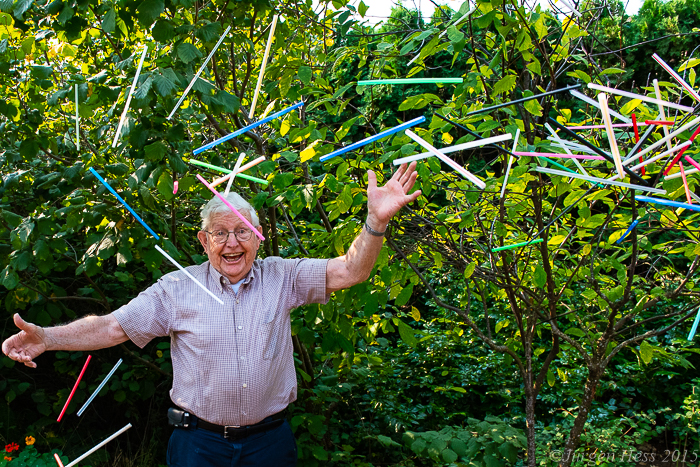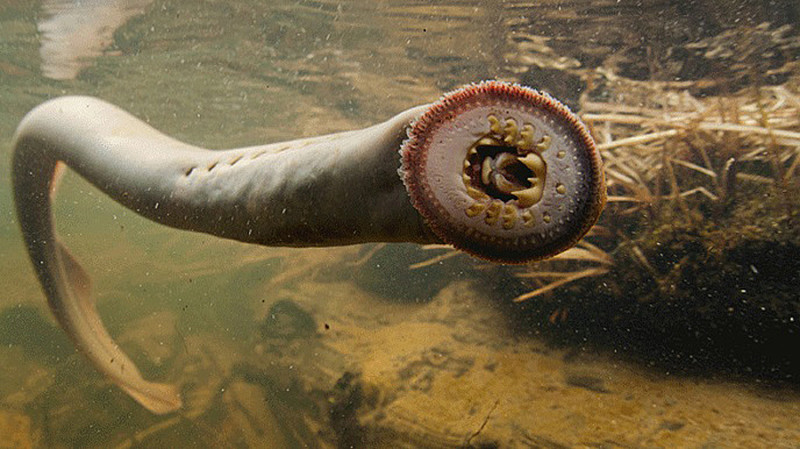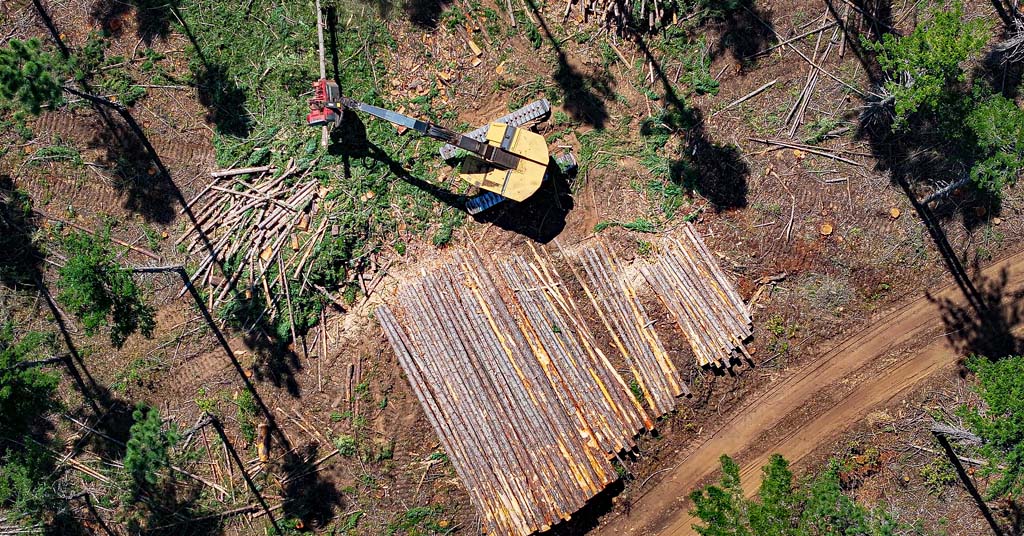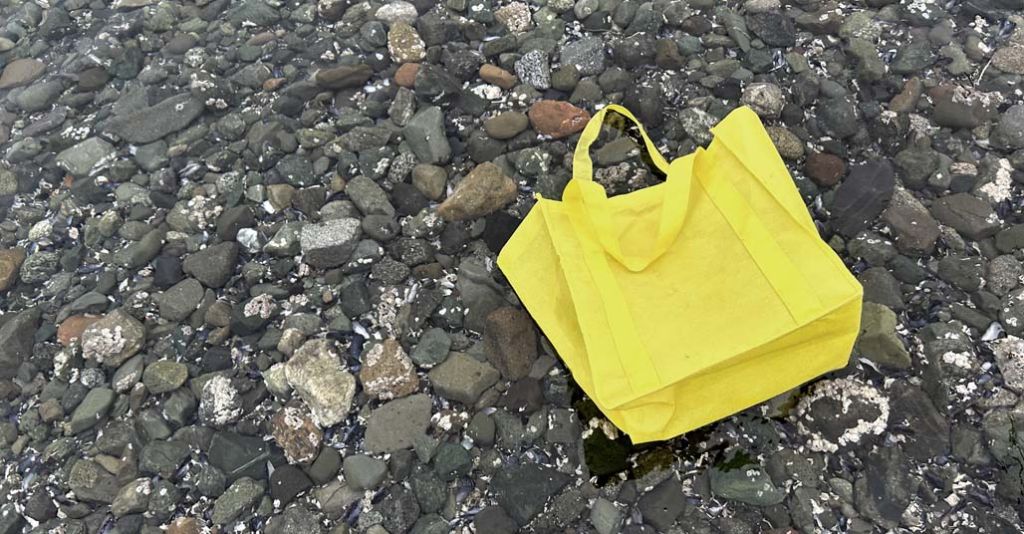By Lauren Church, Intern. Aug. 9, 2018. Single-use plastic straws reside in our drinks for minutes, but survive in our oceans for centuries. Plastic of any kind never truly breaks down. This synthetic material divides into microparticles that contaminate soil, sand, and water. As beneficial as recycling is, it alone doesn’t solve planet Earth’s plastic problem.

Marv Turner tosses a handful of straws found discarded along roadsides, part of Columbia Insight’s litter pickup efforts.
Some of the most disposed plastic items rarely make it to recycling bins: single-use plastic utensils, cups, and straws. This makes these frequently used items one of the largest contributors to the plastic contamination of Earth’s ecosystem.
Here is what happens to me
I walk into a cafe before heading to work in the morning. The weather is a little warmer than usual, so I order iced coffee rather than hot. Before dashing out the cafe door, I grab a plastic straw to stick in the plastic lid of the plastic cup. I figure I’ll recycle it after I finish sipping, so I don?t think much about the waste. I walk down the street sipping and keeping an eye out for a recycling bin. Nothing is in sight, and I decide to throw my trash away. Next time, I tell myself, I’ll definitely recycle.
For the next three summer months, I order an iced latte every day. Maybe half the time I remember to bring a travel mug. Half the time I end up with a disposable plastic cup, straw and lid. Some of my trash makes it to a recycling bin. The remainder ends up in the garbage.
Over a single summer I might put 45 sets of single-use plastic cups, lids, and straws in a landfill. The good news? I’ll probably never see it again. Bad news? A marine life rescue team might.
What makes straws’ special?
Unlike other forms of plastic, straws don’t perform any irreplaceable task. It’s as easy to sip from a cup as to suck from a plastic straw. The disabled or very young may require them; most of us, however, don’t need the little tubes to enjoy a coffee or soda. And, it’s too easy to forget to recycle something so small. Restaurants, coffee shops, and bars go through millions a year. Most don’t take the time to sort recyclable plastic from garbage.
Straws are large enough to visibly pollute land and water, but are small enough to lodge themselves in the stomachs, gills, and other parts of marine animals. They’re a serious problem.
Change is ‘trending’
In 2015, a video of scientists removing a plastic straw from a sea turtle’s nasal cavity went viral (https://www.youtube.com/watch?v=4wH878t78bw). The original copy of the YouTube video has been viewed over 30 million times and has exposed its audience to the horrific effects of plastic straws on the environment.
Since then, many West Coast cities and companies have banished straws. A few weeks ago, San Francisco, California passed a ban on the distribution of plastic straws. Seattle, Washington will enact a complete ban on single-use plastic straws and utensils by 2019. Seattle-based Starbucks recently promised to eliminate all plastic straws from their worldwide establishments by 2020. Portland, Oregon’s mayor, Ted Wheeler, has recently shown interest in moving forward with a similar law. The plastic straw bans in big cities sparked a movement in smaller communities around the world.
Local progress
The chances of being served a straw-accompanied beverage are high in most places despite the increasing number of places eliminating them. But a number of restaurants have changed their policy on providing straws. In Hood River, Oregon, Solstice Woodfire Cafe and Bar is taking an active stand against plastic straw usage and disposal. Beginning in the summer of 2017, Solstice began only providing plastic straws upon request.
“We still had an inventory of plastic straws to go through; and when we used them up, we switched to all paper straws,” said Suzanne Baumhaukel, co-owner of the popular cafe. Furthermore, the restaurant sells kits of metal straws to offer a plastic straw alternative. “Waste in the restaurant industry can be daunting,” she said, “but we are always seeking new ways to reduce packaging and unnecessary waste. Customer response has been extremely positive and we’re delighted by the success of this campaign! We look forward to finding more ways to show our love of the oceans and our precious planet.”
Substitutes
One of the easiest ways to phase out plastic-straw-dependence is to use substitutes. Because of the growing demand for plastic straw alternatives, the range of reusable straw options is expanding. A few of the most popular replacements for plastic straws are made of paper, steel, glass, or silicone. Kits of stainless steel straws and pipettes to clean them with are available for a wide range of prices. Even purchasing cheap, recyclable, and reusable BPA-free hard plastic straws is a clever alternative to the disposable single-use plastic straw.
Reality check
Using non-disposable straw alternatives is one way to join the movement against plastic straws, but it can also be unrealistic. It?s not often that people have a spare clean straw on hand when they order a drink to go. If you’re like me and are looking for a much simpler strategy, simply don’t use one.
Adjustment from cheap, accessible plastic straws takes time and considerable effort. Change is not convenient and is, in its nature, against habit. As a member of humankind, and furthermore, an animal on Planet Earth, it is up to each of us to make an individual lifestyle change to conserve and support other life in the world.
Save a sea turtle, skip a straw.
 Lauren Church is a 2018 graduate of Hood River Valley High School and will be attending Clark Honors College at the University of Oregon fall 2018. She has been actively involved in high school and community theater and choir. In addition to her summer internship with Columbia Insight, she enjoys hiking, writing and working with kids as a Columbia Gorge Peace Village counselor.
Lauren Church is a 2018 graduate of Hood River Valley High School and will be attending Clark Honors College at the University of Oregon fall 2018. She has been actively involved in high school and community theater and choir. In addition to her summer internship with Columbia Insight, she enjoys hiking, writing and working with kids as a Columbia Gorge Peace Village counselor.












Thank you for publishing this article. Plastic straws, cups, lids, bags – and so it goes. Why is cold coffee served in a plastic cup (Dutch Brothers) with lid and straw? So we can sip while driving, not spilling? Another distraction while driving? I am so glad plastic bag use has been reduced in Hood River. A baby step, but important.
Maria, I wonder how many people know that those ‘paper’ cups are plastic lined and cannot be recycled.
And Dutch Bros. does not put out it’s coffee grounds for people to take. but rather simply comingle it with all their other trash – according
to an employee I asked.
Gosh. Dirt Huggers picks up food wastes from many restaurants and coffee shops in the Gorge. You might send the company some info,Judy.
Great article. Does anyone in town sell metal or glass straws?
Hi, Ruth. Yes to both. Eco-Glass Straws is located in Hood River. Waucoma Bookstore sells metal straws. Both also have pipettes to clean the straws.
My junk collector in the car in thecup holder has a mix of many things but mainly the many straws. I save them and use them to mark plants in the garden, or if planting small plants elsewhere I will put two or three brightly colored straws around them. Saves lots of plants until they get knee high.
My junk collector in the car in the cup holder has a mix of many things but mainly the many straws. I save them and use them to mark plants in the garden, or if planting small plants elsewhere I will put two or three brightly colored straws around them. Saves lots of plants until they get knee high.
It is much safer to use a straw in your beverage while driving. plus, if you are addictedto coffee, your teeth wont get stained. we all just need to be more responsible and recycle those straws.
Dutch Bros. also uses two of the non-recyclable cups for insulation, doubling the waste. If they would go to the unbleached insulation sleeves they would save money and create less waste simultaneously.
Since when are straws are recyclable? And more importantly, where? :)
Also, Dirt Hugger receives the compost that Wast Connections/Hood River Garbage collects from local downtown HR businesses. Heidi